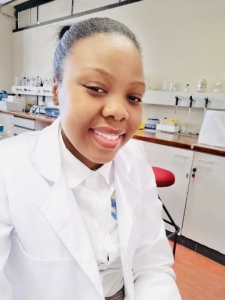About Zenande Pali

Zenande Pali
Tell us about yourself – A brief biography on your place of birth, educational history (high school and higher institution), work etc…
I am Zenande Pali and I am 23 years old. I grew up in East London in the Eastern Cape. Growing up, I was always very passionate, hard-working and dedicated and, as a result, I was amongst the top achievers in my class. I attended Excelsior Comprehensive School, which is in a small town called Mthatha, and I matriculated from there in 2014.
I enrolled for a BSc in Medical Sciences at Walter Sisulu University in 2015 and I graduated in 2018. I decided to further my studies with BSc (Honours) in Human Physiology and I was funded by an NRF bursary. After obtaining an honours degree in 2019, I was employed at Nelson Mandela University in the Physiology Department as an NRF intern for a year. I am currently registered for a master’s degree in Nanoscience (Biomed) at Nelson Mandela University and I am doing my coursework at the University of Western Cape.
Why did you choose this career path and what influenced you to pursue it?
Initially, I was not well informed about the options in science and research. I applied for Medical Sciences as my second choice and, after being accepted, I believe that it was something that I was destined for. After my first graduation I knew that I was going to further my studies so that I could enhance my skills and knowledge in this field. The NRF internship also opened many doors for me. It exposed me to a different working environment and it stimulated my enthusiasm to enrol for a master’s degree.
What average marks in matric (maths and science) are required to study this degree in university?
It varies with institutions, but I would say you must have good marks in maths and science. There is limited space in universities, and the higher the marks you get, the better the chances are for you to be accepted. Make sure that you obtain at least 60% and above in those subjects.
Did you always intend to be a scientist, if not, what was your dream career?
As I have mentioned, I had a lack of knowledge about science and it was my second option. My first option was to study toward a Bachelor of Medicine and Surgery. However, I am now content and enjoying developing myself in the science and research field.
At present, what are you working on?
I am currently registered for a master’s degree in Nanoscience, majoring in Nano Biomedical Sciences. My area of interest is green nanotechnology and cancer, and I will be working on synthesising gold nanoparticles using a certain plant or plants for cancer treatments. Cancer is one of the major global and national health issues and is the second leading cause of death globally. Current cancer treatments are expensive, and they are associated with numerous side effects. I am, therefore, looking into testing the efficacy of medicinal plants and gold nanoparticles to assist in solving this global issue.
What is your opinion on female representation in the nanotechnology industry?
This industry is very exciting, and I wish that young female aspiring scientists would join me in learning and finding their way in this industry. There have been few women who have been recognised in science and technology in the past. Therefore, I concur with the notion of increasing the number of females in this field and I hope to do my part of empowering other young women. I believe that we can be represented more in nanoscience, so that we can shine like the diamonds that we are.
What is the biggest challenge you have encountered so far in your journey as a scientist and how did you overcome it?
The major challenge I have encountered would be having to spend long hours in the lab without finding any positive or desired results. It can be disheartening, however, patience and persistence has allowed me to overcome this challenge and push through. In postgraduate level you are expected to learn certain techniques and procedures by yourself. It’s not easy, but I can assure you that it is achievable.
Which undergraduate degree should someone enrol in, in order to become a specialist in your field?
BSc in Medical Science (Physiology, Microbiology, Biochemistry or any other related field).
Share a turning point or defining moment in your work as a scientist?
A turning point for me involved struggling in the lab without getting results when I had followed all the methods and procedures that I had studied s in literature. Due to this struggle, I have learnt that you need to be a critical thinker, be dedicated and be able come up with strategies and plans to make things work. Although it is very rewarding, research is not easy and you need to take it one step at a time because you might not always get the expected results.
What is your advice to young, aspiring female scientists and students?
Science and research require you to remain focused and understand very well the aim of what you are trying to achieve. Therefore, you should always open up to acquire all the necessary knowledge. You should always be inquisitive and take time to learn about your field of interest. You must always be confident and honest with yourself. Above all, make sure that you have a heart for science.
What is your next move career wise and what are you most looking forward to?
I am going to further my studies and enrol for a PhD. I would like to become an expert in my field, as young as I am, and will face every pressure, understand it and embrace it so I may grow.
